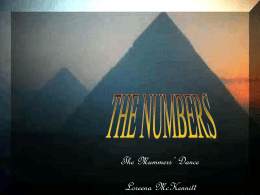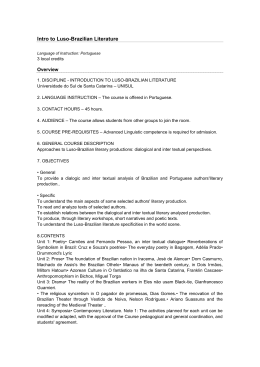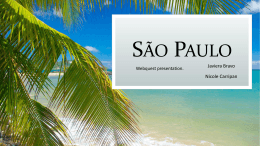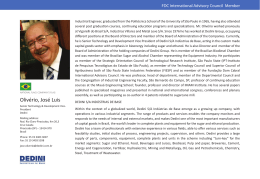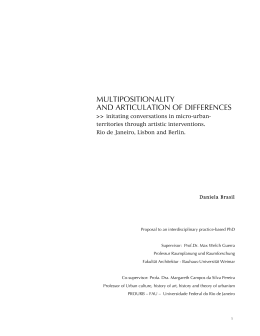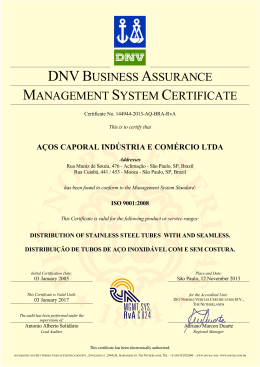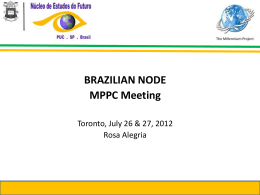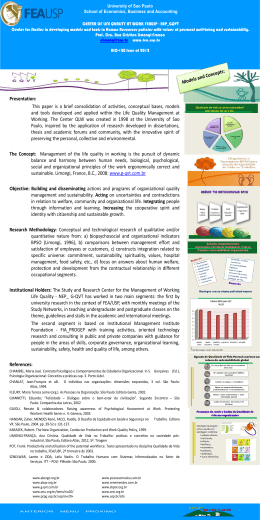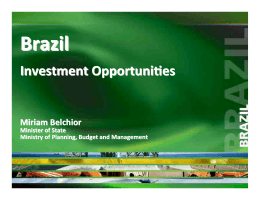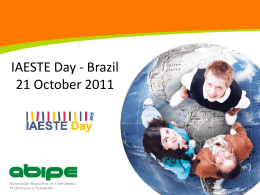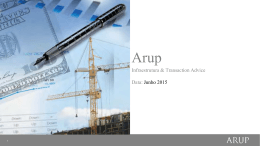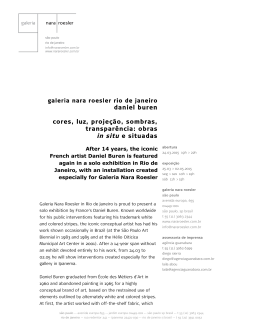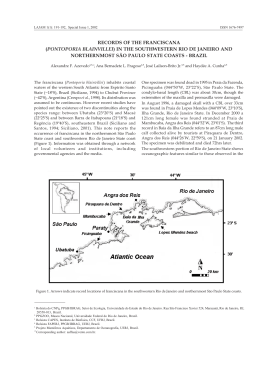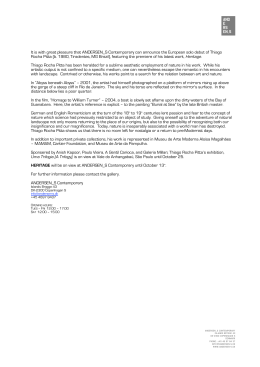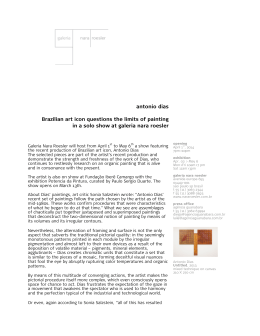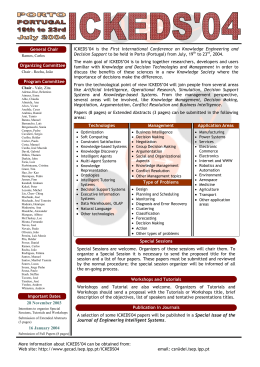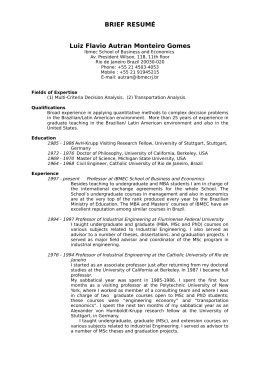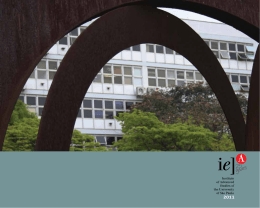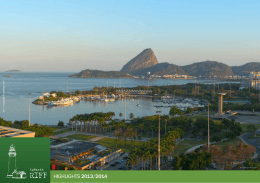Boston University College and Graduate School of Arts & Sciences COURSE APPROVAL FORM DATE SUBMITTED: 02/28/3014 DEPT/COURSE #: Romance Studies (X) New Course: ( ) Revision of Course: To be offered: ( ) Number ( ) 40 Word Description Sem./Year Spring 2015 ( ) Title ( ) Prerequisite ( ) Syllabus ( ) Other: The following materials must be submitted along with this course approval form. Attach to proposal: - Week-by-week syllabus matching assigned readings with class meetings (see “Checklist for Preparation of Syllabi” at http://www.bu.edu/ceit/teaching-resources/writing-a-syllabus)) - Cognate comment from Chairmen in relevant departments and/or programs (use form at http://www.bu.edu/cas/faculty-staff/form) .............................................................................................................................................................................. ......... ......... PROPOSED COURSE NUMBER: CAS LP 350 INSTRUCTOR: (CURRENT COURSE NUMBER if revision: ) Rodrigo Lopes de Barros PROPOSED TITLE: Brazilian Literature Before 1900 (CURRENT TITLE if revision: ) PREREQUISITES: (Indicate “AND” or “OR” wherever relevant) CREDITS: Class Standing in CAS: ( ) Half course - 2 credits AND / OR (X) Full course - 4 credits ( ) Year course - 8 credits ( ) Variable (Please describe) OR Courses: CAS LP 212 Consent of Instructor AND / OR Other (Please Describe) SUGGESTED SHORT TITLE Appears in On-line Course Inventory and on student transcripts. 15 Character Maximum (including spaces) B r a z i l l i t 1 9 0 0 FORTY-WORD DESCRIPTION: (40 words or fewer) Note: This description is used for the CAS/GRS Bulletin. If this proposal is for a revision of the course description, please attach a copy of the existing description. Brazilian literature from the colonial period to 1900. Topics include Jesuits and indigenous peoples; the Baroque and satirical poetry; the struggle for independence; the abolition of slavery; the process of modernization; the rise of the metropolis. 1 Divisional Studies (Optional) If this course is intended to fulfill Divisional Studies requirements please attach a memo of justification from the chairman. Please answer the following questions: (Required for all proposals) 1. If this course is a revision, how has it changed and why? NA 2. How frequently will the course be offered? Once every 2 years 3. Are the present facilities, such as library, laboratory, and other technical resources, adequate for the proposed course? Yes 4. Are there courses in the course inventory (CC00) with the same number and/or title as this course? If yes, any active course(s) that repeat the number or title of this course approval request should be phased out NA 5. What is the budgetary source of support for this course? Romance Studies 6. What is the estimated start-up cost for this course? 0.0 7. Is this course cross listed or taught with some other course? If yes, which one? No 8. What is the intended function of this course? Explain how this course is related to other similar courses in your department, in other departments, and in other schools and colleges at Boston University. This course serves as an introduction to the study of Brazilian literature and prepares students to read literary texts in Portuguese. The course is related to LS 350 (“Introduction to the Analysis of Hispanic Texts”) as well as similar courses in French and Italian. It will function as a bridge course between the language curriculum and our literature/culture courses. 9. If this course is being offered at an external program/campus, please provide a brief description of that program and attach a curriculum vitae for the proposed instructor. NA 2 Department Approval: Department Chair Date Second Department Chair if this is a cross-listed course Date Contact person for questions/notification regarding this proposal: Name (PLEASE PRINT) Extension ================================================================================================ DEAN’S OFFICE CURRICULUM ADMINISTRATOR USE ONLY: CAS/GRS CURRICULUM COMMITTEE APPROVAL: ( ) Approved Date: ( ) Not Approved Date: ( ) Tabled Date: ( ) Divisional Studies Request: Endorsed / Not Endorsed HU NS SS Curriculum Committee Chair Signature Comments: Provisional Approval requested for Semester/Year: ( ) Approved Date: Dean of Arts and Sciences Signature Comments: FACULTY ACTION: Faculty Meeting Date: ( ) Approved ( ) Not Approved Curriculum Administrator Signature Comments: PLEASE SUBMIT THE ORIGINAL ALONG WITH APPROPRIATE MATERIALS TO: Peter Law, 725 Commonwealth Avenue, CAS 106, Telephone x3-7243 3 Brazilian Literature before 1900: From Colony to the End of the Empire CAS LP 350 M-W-F 10:00-11:00 Rodrigo Lopes de Barros Office Hours: MW 12-1 or by appt. 718 Commonwealth Ave. #201A [email protected] CAS 424 Course Description This course provides concepts for the understanding of Brazilian literature from the colonial period (16th-18th centuries) to 1900. These inaugural texts of Brazilian literature will be studied in relation to their European models such as Camões, Gil Vicente, Góngora and Quevedo, taking into consideration the process by which they circulated in their respective periods: manuscripts, public readings, performances, and printed books. The 19th-century authors will be studied in terms of their attempt to establish a national identity for a recently independent country and also to innovate with respect to earlier literary styles. One of the main purposes of the course is to offer tools for the critical reading of the literary texts covered, taking into account the specific historical, socio-political and economic context of each period. Grading Two exams (30% [15% each]); Two Essays (30% [15% each]); presentation (30%); participation (10%). Exams: The content of the exams will center on the texts studied and the accompanying inclass discussions. Questions will require short written responses (1-2 paragraphs). Essays: The essays will develop in greater depth one of the subjects discussed in the course. Students may conduct research on one of the directors/authors included in the syllabus or they can choose others that are related to their topic. The essays will be 7 pages long (double space, 12pt.). Presentation: Each student will comment orally (15 minutes) on a specific text or film (see below) on a date chosen in consultation with the professor. Students can use audio-visual materials and handouts; presentations should be well organized. Students can bring notes and use them as an aid. Students will be evaluated on their use of the Portuguese language. Detailed guidelines will be provided at the beginning of the semester to help in the preparation of the class presentation. 1 Participation: students are expected to participate actively in class discussion, offering comments and fielding questions. All students entering Boston University are expected to maintain high standards of academic honesty and integrity. It is the responsibility of every undergraduate student to be aware of the Academic Conduct Code’s contents and to abide by its provisions. The Academic Conduct Committee of the individual School or College, which is composed of students, faculty and staff, has jurisdiction over all charges of academic misconduct brought against students. For more information on the academic conduct code, see: http://www.bu.edu/academics/policies/academic-conduct-code/ Class Material Required Books: Gil Vicente, Auto da Barca do Inferno. São Paulo: Atelie Editorial, 1996. Luís Vaz de Camões, Os Lusíadas. São Paulo: Atelie Editorial, 1999. Manuel Botelho de Oliveira, Música do Parnaso. São Paulo: Atelie Editorial, 2005. Ivan Teixeira. Raízes. São Paulo: Global, 2008. Additional Texts will be placed on Blackboard. Films will be placed on reserve at Mugar Library. Readings Students must read the required texts before each class. They represent the main topic of discussion of the day. Students will be expected to contribute with comments and questions during the discussion. Class Schedule Week 1: Portuguese Society in the 1500s: the Theater of Gil Vicente. Required: 1. Gil Vicente, Auto da Barca do Inferno. São Paulo: Atelie Editorial, 1996. January 21: pages 41-61. January 23: pages 62-82. 2 Week 2: The Portuguese Oceanic Adventure: Os Luíadas and Maritime Exploration. Required: 1. Luís Vaz de Camões, Os Lusíadas. São Paulo: Atelie Editorial, 1999, selected strophes. January 26: pages 105-127. January 28: pages 155-174. January 30: pages 285-300. Week 3: Brazil in the 1500s: Indigenous Peoples, Travelers and Jesuits. Required: 1. José de Anchieta, “Auto das Onze Mil Virgens.” Raízes. São Paulo: Global, 2008. 2. José de Anchieta, “Do Santíssimo Sacramento.” Raízes. São Paulo: Global, 2008. February 2: pages 39-47. February 4: pages 49-60. February 6: Review Week 4: From Colonization to the Emergence of Literature: Bento Teixeira and his Epic Poem of Pernambuco. Required: 1.Bento Teixeira, “Prosopopéia.” In Raízes. São Paulo: Global, 2008. February 9: 61-80. February 11: 81-96. February 13: Exam # 1 Week 5: Barroco/Maneirismo: The “Mouth of Hell” (The Satiric Poems of Gregório de Matos in Brazil) Required: 1, Gregório de Matos, selection of poems. Raízes. São Paulo: Global, 2008. 3 February 23: pages 97-114. February 25: pages 115-130. February 27: pages 131-143. Week 6: Barroco/Maneirismo: “Acuteness” and “Ingenuity” in the Poetry of Botelho de Oliveira. Required: 1. Manuel Botelho de Oliveira, Música do Parnaso. São Paulo: Atelie Editorial, 2005. February 23: pages 1-19. February 25: pages 20-39. February 27: pages 39-42 and 127-136. Week 7: Brazil and the Portuguese State: José Basílio da Gama and O Uraguai, I. Required: 1. José Basílio da Gama, O Uraguai. Rio de Janeiro: Livraria AGIR, 1964. March 16: pages 1-20. March 18: pages 21-40. March 20: pages 41-60. Week 8: Brazil and the Portuguese State: José Basílio da Gama and O Uraguai, II. Required: 1. José Basílio da Gama, O Uraguai. Rio de Janeiro: Livraria AGIR, 1964. March 16: pages 61-80. March 18: pages 81-100. March 20: pages 101-124. Essay # 1 (due March 20) Week 9: Poets of the “Inconfidência Mineira” and the Beginning of Brazilian Independence. Required: 4 1. Claudio Manuel da Costa. Selection of Poems. In Os poetas da Inconfidência. Rio de janeiro: Nova Fronteira, 1989. 2. Tomás Antônio Gonzaga. Selection of Poems. In Os poetas da Inconfidência. Rio de janeiro: Nova Fronteira, 1989. March 23: 79-85 March 25: 86-105. March 27: 106-124. Week 10: The Fear of a New Haiti: Literature, Slavery, and Abolition in Brazil. Required: 1. Joaquim Manuel de Macedo, As Vítimas-algozes: quadros da escravidão. Rio de Janeiro: Fundação Biblioteca Nacional. April 06: pages 1-12. April 08: pages 13-26. April 10: pages 27-36. Week 11: The Émile Zola of the Tropics: Naturalist Literature in Brazil, Part I. Required: 1. Aluísio de Azevedo, O Cortiço. Rio de Janeiro, Americana, 1973. April 06: pages 19-40. April 08: pages 41-60. April 10: pages 61-80. Week 12: The Émile Zola of the Tropics: Naturalist Literature in Brazil, Part II. Required: 1. Aluísio de Azevedo, O Cortiço. Rio de Janeiro, Americana, 1973. April 13: pages 81-100. April 15: pages 101-120. April 17: Exam #2 5 Week 13: The Education of Women in the 19th Century. Required: 1. Júlia Lopes de Almeida, Ancia Eterna. Rio de Janeiro: H. Garnier, Livreiro-Editor, 1903. April 20: No class. April 22: 1-21. April 24: 23-40. Week 14: Realism and Slavery: Machado de Assis. Required: 1. Machado de Assis, “Pai contra mãe”. Obra Completa, de Machado de Assis, vol. II, Nova Aguilar, Rio de Janeiro, 1994. April 27: Short story: “Pai contra mãe”. April 29: Short story: “O Espelho”. Essay # 2 (due April 29) 6
Download
